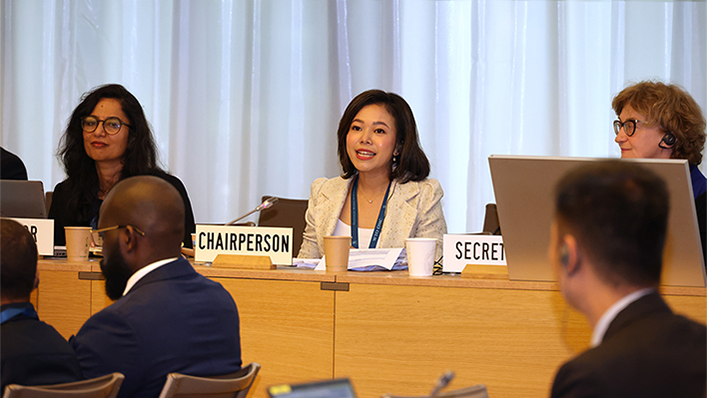
Five members — China, Colombia, Ecuador, Lao People’s Democratic Republic and the Republic of Moldova — shared their experiences of using digitalization to facilitate trade, in line with the committee’s decision to focus on this topic in 2024. Their presentations can be accessed here.
Earlier this year, members presented to the committee their experiences of using data and technology to simplify trade procedures, how to promote the implementation of the Trade Facilitation Agreement through digital approaches and smart technologies, and the digitalization of border procedures.
Transit issues of landlocked countries
Ambassador Athaliah Molokomme from Botswana opened a discussion on challenges faced by landlocked developing countries (LLDCs) and other WTO members in the transit of goods. Four members — Burkina Faso, Kenya, Lao People’s Democratic Republic and Zambia — discussed their experiences of cross-border coordination and operational cooperation in inspections, risk management, harmonized procedures and information sharing. Additionally, they emphasized the importance of involving relevant stakeholders, such as customs, government agencies and the private sector, in a session moderated by Ecuador.
In a discussion moderated by Mozambique on the management of transit operations and consignments at border crossing and inspection points, several WTO members — Eswatini, the European Union, the Republic of Moldova, and Niger — shared their experiences and good practices regarding border clearance for transit consignments.
Other committee work
The WTO Secretariat provided a status report concerning the ratification and implementation of the Trade Facilitation Agreement. The TFA entered into force in 2017 and contains provisions for expediting the movement, release, and clearance of goods, including goods in transit. It is the first WTO agreement in which developing members and least developed country (LDC) members can determine their own implementation schedules and seek to acquire implementation capacity through the provision of related assistance and support.
As of 10 July, notifications submitted by developing members and LDC members reveal they have committed to implement 74% of their TFA obligations. Developed members were required to implement all provisions of the TFA from its entry into force. Five members are yet to deposit their ratifications of the TFA. The Bolivarian Republic of Venezuela formally accepted the Trade Facilitation Agreement on 11 June 2024. The Secretariat’s presentation can be accessed here.
Other topics covered during the meeting included the United States’ concern over Indonesia’s customs procedures for intangible products and the agenda for a forthcoming dedicated session on technical assistance and capacity building. Members also discussed a report on the Global Alliance for Trade Facilitation’s panel on “Humanitarian Aid for Trade” held at the Global Review of Aid for Trade on 27 June and heard updates from the TFA Facility, which aims to help developing members implement the TFA.
In addition, members discussed a revised version of “Good Practices and Building Blocks of Successful National Trade Facilitation Committees”, which reflects the experiences shared by members and international organizations.
The committee chair, Ms. Chanikarn Dispadung of Thailand, announced that the next committee meeting will be held on 22-24 October 2024.
Share
Reach us to explore global export and import deals